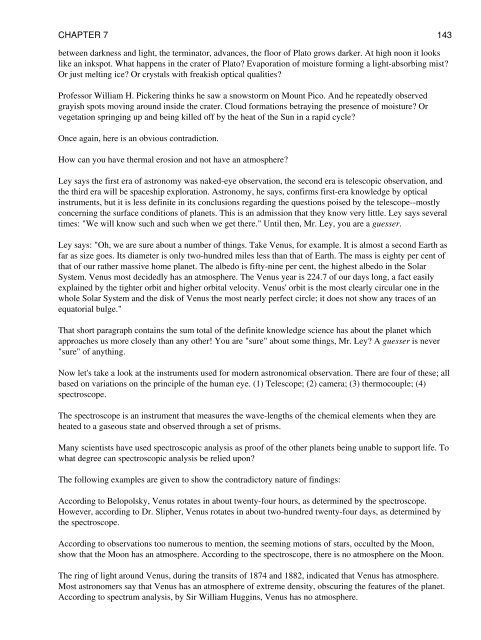CHAPTER 2 CHAPTER 3 CHAPTER 1 CHAPTER 2 CHAPTER 3 ...
CHAPTER 2 CHAPTER 3 CHAPTER 1 CHAPTER 2 CHAPTER 3 ...
CHAPTER 2 CHAPTER 3 CHAPTER 1 CHAPTER 2 CHAPTER 3 ...
Create successful ePaper yourself
Turn your PDF publications into a flip-book with our unique Google optimized e-Paper software.
<strong>CHAPTER</strong> 7 143<br />
between darkness and light, the terminator, advances, the floor of Plato grows darker. At high noon it looks<br />
like an inkspot. What happens in the crater of Plato? Evaporation of moisture forming a light-absorbing mist?<br />
Or just melting ice? Or crystals with freakish optical qualities?<br />
Professor William H. Pickering thinks he saw a snowstorm on Mount Pico. And he repeatedly observed<br />
grayish spots moving around inside the crater. Cloud formations betraying the presence of moisture? Or<br />
vegetation springing up and being killed off by the heat of the Sun in a rapid cycle?<br />
Once again, here is an obvious contradiction.<br />
How can you have thermal erosion and not have an atmosphere?<br />
Ley says the first era of astronomy was naked-eye observation, the second era is telescopic observation, and<br />
the third era will be spaceship exploration. Astronomy, he says, confirms first-era knowledge by optical<br />
instruments, but it is less definite in its conclusions regarding the questions poised by the telescope--mostly<br />
concerning the surface conditions of planets. This is an admission that they know very little. Ley says several<br />
times: "We will know such and such when we get there." Until then, Mr. Ley, you are a guesser.<br />
Ley says: "Oh, we are sure about a number of things. Take Venus, for example. It is almost a second Earth as<br />
far as size goes. Its diameter is only two-hundred miles less than that of Earth. The mass is eighty per cent of<br />
that of our rather massive home planet. The albedo is fifty-nine per cent, the highest albedo in the Solar<br />
System. Venus most decidedly has an atmosphere. The Venus year is 224.7 of our days long, a fact easily<br />
explained by the tighter orbit and higher orbital velocity. Venus' orbit is the most clearly circular one in the<br />
whole Solar System and the disk of Venus the most nearly perfect circle; it does not show any traces of an<br />
equatorial bulge."<br />
That short paragraph contains the sum total of the definite knowledge science has about the planet which<br />
approaches us more closely than any other! You are "sure" about some things, Mr. Ley? A guesser is never<br />
"sure" of anything.<br />
Now let's take a look at the instruments used for modern astronomical observation. There are four of these; all<br />
based on variations on the principle of the human eye. (1) Telescope; (2) camera; (3) thermocouple; (4)<br />
spectroscope.<br />
The spectroscope is an instrument that measures the wave-lengths of the chemical elements when they are<br />
heated to a gaseous state and observed through a set of prisms.<br />
Many scientists have used spectroscopic analysis as proof of the other planets being unable to support life. To<br />
what degree can spectroscopic analysis be relied upon?<br />
The following examples are given to show the contradictory nature of findings:<br />
According to Belopolsky, Venus rotates in about twenty-four hours, as determined by the spectroscope.<br />
However, according to Dr. Slipher, Venus rotates in about two-hundred twenty-four days, as determined by<br />
the spectroscope.<br />
According to observations too numerous to mention, the seeming motions of stars, occulted by the Moon,<br />
show that the Moon has an atmosphere. According to the spectroscope, there is no atmosphere on the Moon.<br />
The ring of light around Venus, during the transits of 1874 and 1882, indicated that Venus has atmosphere.<br />
Most astronomers say that Venus has an atmosphere of extreme density, obscuring the features of the planet.<br />
According to spectrum analysis, by Sir William Huggins, Venus has no atmosphere.






